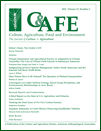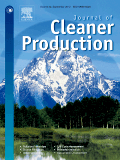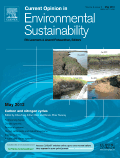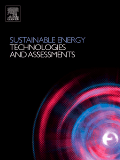
Sustainability-Science Practice and Policy
Scope & Guideline
Advancing interdisciplinary solutions for a sustainable future.
Introduction
Aims and Scopes
- Interdisciplinary Research on Sustainability:
The journal encourages contributions that integrate various fields of study, including environmental science, sociology, economics, and political science, to develop a comprehensive understanding of sustainability issues. - Policy Analysis and Recommendations:
A core focus is on evaluating existing policies and proposing new frameworks that can facilitate sustainable practices across different sectors and communities. - Social-Ecological Systems:
The journal emphasizes research that explores the interactions between social and ecological systems, highlighting the importance of understanding these dynamics for effective sustainability strategies. - Sustainable Consumption and Production:
Research that examines patterns of consumption and production, and how they can be modified to promote sustainability, is a significant area of focus. - Community Engagement and Participation:
The journal supports studies that investigate the role of community involvement in sustainability initiatives, emphasizing the importance of local knowledge and practices. - Innovative Practices and Technologies:
Contributions that showcase innovative approaches and technologies for achieving sustainability goals are encouraged, particularly those that demonstrate practical applications.
Trending and Emerging
- Sustainability in Fashion and Textiles:
Recent publications increasingly focus on sustainable practices within the fashion industry, addressing issues such as fast fashion, circular economy initiatives, and consumer behavior. - Social Equity and Justice in Sustainability:
There is a growing emphasis on the intersection of social justice and sustainability, with research exploring how inequalities affect sustainability outcomes and the importance of inclusive practices. - Climate Change Adaptation and Mitigation Strategies:
The journal is publishing more studies that examine innovative strategies for adapting to and mitigating climate change impacts, reflecting urgent global concerns. - Community-Based Sustainability Initiatives:
Research highlighting grassroots movements and community-led initiatives is on the rise, showcasing the importance of local engagement in sustainability transitions. - Technological Innovations for Sustainability:
There is an increasing focus on the role of technology, including Industry 4.0 and digital tools, in facilitating sustainability transitions and enhancing efficiency. - Degrowth and Alternative Economic Models:
Emerging discussions around degrowth and alternative economic frameworks challenge traditional growth paradigms, emphasizing sustainability and well-being over economic expansion.
Declining or Waning
- Traditional Economic Growth Models:
There has been a noticeable decrease in papers advocating for conventional economic growth strategies, as the journal increasingly emphasizes alternative models that prioritize sustainability over growth. - Overly Technical Approaches to Sustainability:
Research that focuses solely on technical solutions without considering social and cultural contexts is becoming less frequent, indicating a shift towards more holistic and integrative approaches. - Single-Dimensional Environmental Assessments:
The journal is moving away from studies that assess sustainability solely from an environmental perspective, favoring research that includes social, economic, and political dimensions. - Sector-Specific Studies:
There appears to be a decline in papers focusing exclusively on individual sectors (e.g., agriculture, fashion) without connecting them to broader sustainability challenges, as interdisciplinary research gains more traction. - Short-Term Solutions:
Research that proposes short-term fixes to sustainability issues without addressing underlying systemic problems is becoming less common, reflecting a growing preference for long-term, transformative solutions.
Similar Journals

Geography and Sustainability
Advancing Knowledge for a Sustainable World.Geography and Sustainability is a prestigious, peer-reviewed journal published by Elsevier, focusing on the interdisciplinary fields of geography, ecology, and environmental science. As an Open Access publication since 2020, it aims to provide a platform for the dissemination of high-quality research that addresses critical sustainability challenges facing our planet. Based in China, the journal navigates through an impressive array of categories, all classified in the Q1 Quartile rankings for 2023, showcasing its top-tier status in areas such as Earth-Surface Processes, Geography, Planning and Development, and Nature and Landscape Conservation. With its notable impact factors—ranked 2nd in Earth and Planetary Sciences and 3rd in Environmental Science—it attracts contributions from leading experts and emerging scholars alike. Researchers, professionals, and students seeking to advance the scientific understanding of sustainability and its geographical implications will find indispensable resources and innovative findings within the pages of this journal.

Global Sustainability
Connecting Ideas to Transform Our PlanetGlobal Sustainability, published by Cambridge University Press, serves as a pivotal platform for interdisciplinary research in the realms of sustainability, management, and environmental policy. Since its establishment as an Open Access journal in 2018, it has empowered researchers, professionals, and students by ensuring that high-quality research is widely accessible. With an impressive impact factor reflected in its Q1 category rankings in both Global and Planetary Change and Management, Monitoring, Policy and Law, this journal is at the forefront of advancing knowledge and strategies crucial for sustainable development. Operating from its headquarters in Cambridge, United Kingdom, this journal not only influences academic discourse but also plays a significant role in shaping public policy and practices towards a more sustainable world. Researchers are encouraged to submit innovative contributions as the journal continues to converge impactful scholarship from 2018 to 2024 and beyond.

Culture Agriculture Food and Environment
Connecting Cultures through Agriculture and Environmental InsightsCulture Agriculture Food and Environment, published by WILEY, is an esteemed journal that serves as a pivotal platform for interdisciplinary research at the intersection of cultural studies, anthropology, and agricultural sciences. With its ISSN 2153-9553 and E-ISSN 2153-9561, this journal aims to foster scholarly dialogue on the complex relationships between food, culture, and environmental sustainability. As of 2023, it proudly holds a Q2 ranking in Agricultural and Biological Sciences and Anthropology, as well as a Q1 ranking in Cultural Studies, indicating its significant impact within these disciplines. Researchers and professionals will appreciate its rigorous peer-review process and diverse coverage, which extends from 2011 to 2024, reflecting ongoing debates and innovations in the field. Although open access options are not provided, the journal's commitment to advancing knowledge in understanding food systems and cultural practices makes it a vital resource for academics and practitioners alike, promoting a deeper understanding of the cultural dimensions of agriculture and the environment.

Sustainability
Unveiling Pathways to a Greener TomorrowSustainability is a leading open-access journal published by MDPI, dedicated to the interdisciplinary exploration of sustainability across diverse fields including environmental science, energy engineering, and social governance. Since its inception in 2009, this journal has steadily gained prominence, currently holding a significant Impact Factor and achieving notable rankings in various Scopus categories, such as Q1 in Geography, Planning and Development and Q2 in Energy Engineering and Power Technology. With its base in Switzerland, Sustainability fosters dialogues around pressing global issues and sustainable practices, making a substantial contribution to academia and industry alike. Researchers and professionals are encouraged to share innovative ideas and findings that advance the understanding of sustainability challenges and solutions. The journal's commitment to Open Access ensures that high-quality, peer-reviewed research is readily available to researchers, educators, and policymakers worldwide.

Journal of Cleaner Production
Fostering Knowledge for a Sustainable WorldThe Journal of Cleaner Production, published by Elsevier Science Ltd, is a leading interdisciplinary journal dedicated to the development and dissemination of knowledge on environmental sustainability and cleaner production practices. With an impact factor that reflects its high relevance in the field, the journal is recognized as a Q1 publication in key categories including Environmental Science, Industrial and Manufacturing Engineering, Renewable Energy, and Strategy and Management as of 2023. This prestigious journal has been a platform for groundbreaking research since its inception in 1993 and continues to shape the dialogue around sustainable practices in various sectors. Researchers and professionals across disciplines can access its wealth of insights, which are critical for driving the transition towards more sustainable production and consumption models. The journal’s rigorous peer-review process ensures that only high-quality research is published, making it an essential resource for academics, industry leaders, and policymakers committed to advancing cleaner production methodologies.

Current Opinion in Environmental Sustainability
Fostering Insightful Dialogues on Environmental ProgressCurrent Opinion in Environmental Sustainability, published by Elsevier Science Ltd, is a leading academic journal that specializes in exploring innovative strategies and emerging trends in environmental sustainability. With an impressive impact factor that reflects its esteemed position within the field, this journal is classified as Q1 in both the Environmental Science and Social Sciences categories for 2023, indicating its high-quality and influential contributions. The journal has been at the forefront of sustainability discussions since its inception in 2009 and continues to provide a platform for multidisciplinary research and critical analysis. As a key resource for researchers, professionals, and students alike, Current Opinion in Environmental Sustainability ensures open access to valuable insights while fostering collaboration and knowledge sharing across various domains. This journal not only serves to inform and inspire but also aims to address the pressing challenges of sustainability in our evolving world, making it an essential read for anyone engaged in environmental studies.

Sustainable Energy Technologies and Assessments
Empowering Innovations in Energy EngineeringSustainable Energy Technologies and Assessments is a prestigious journal published by ELSEVIER, based in the United Kingdom, focusing on the critical field of energy engineering and its intersection with sustainability. Since its inception in 2013, the journal has established itself as a leading platform for disseminating innovative research and assessments of sustainable energy technologies, earning a notable Q1 ranking in both Energy Engineering and Power Technology, as well as Renewable Energy, Sustainability, and the Environment. With an impressive Scopus ranking—#22 out of 272 in Energy Engineering and #40 out of 270 in Renewable Energy—this journal is essential for researchers and professionals seeking to advance their knowledge on cutting-edge developments and assessments in sustainable energy. Although the journal operates on a subscription basis, it remains committed to promoting high-quality research that aligns with global sustainability objectives. Researchers and students alike will find invaluable insights and data that shape the future of renewable energy technologies within these pages.

Agricultural and Resource Economics-International Scientific E-Journal
Navigating the economics of sustainability and resource use.Agricultural and Resource Economics-International Scientific E-Journal is a leading open-access publication dedicated to advancing the fields of agricultural and resource economics. Published by the esteemed INST EASTERN EUROPEAN RESEARCH & CONSULTING since 2015, this journal provides a vital platform for innovative research and discourse, particularly within the context of Eastern Europe. With an impressive Q2 ranking in Agricultural and Biological Sciences and Q3 rankings in both Business, Management and Accounting and Marketing, it serves as a key resource for academics and practitioners alike, fostering collaboration and knowledge exchange. The journal's commitment to accessibility and inclusivity is evident through its open-access policy, allowing researchers from around the globe to share and benefit from cutting-edge findings. Set against the backdrop of a rapidly evolving agricultural landscape, this journal plays a crucial role in exploring the intersection of economics, sustainability, and resource management, making it an essential read for anyone invested in the future of these critical fields.

Journal of Environmental Studies and Sciences
Illuminating the path to sustainable development.Journal of Environmental Studies and Sciences, published by SPRINGER, serves as a pivotal platform for advancing the field of environmental science and related disciplines. With an ISSN of 2190-6483 and E-ISSN of 2190-6491, this esteemed journal has established itself as a reputable source of knowledge since its inception in 2011. Covering an expansive range of topics related to environmental studies, the journal has achieved a commendable position within the academic community, evidenced by its 2023 category quartiles, ranking in the Q2 tier for both Environmental Science (miscellaneous) and Geography, Planning and Development. The journal's Scopus rankings further highlight its impact within the fields of Geography, Planning and Development, and General Environmental Science, boasting a respectable percentile rank of 69th and 58th respectively. Although it does not currently offer Open Access, the Journal of Environmental Studies and Sciences remains an essential resource for researchers, professionals, and students aiming to explore critical environmental issues, engage with innovative research, and contribute to sustainable development practices. Its ongoing commitment to academic rigor ensures that it continues to play a vital role in shaping the discourse around environmental challenges and solutions.

Progress in Energy
Unlocking the Future of Energy Through Open AccessProgress in Energy, published by IOP Publishing Ltd, is an esteemed open-access journal that focuses on cutting-edge research in the field of energy. With its e-ISSN 2516-1083, this journal stands out for its commitment to disseminating high-quality articles that aim to advance the understanding and application of energy technologies and policies. Juggling respectably in the academic arena, it proudly holds a Q1 classification in the energy (miscellaneous) category and ranks 6th out of 73 in the general energy sector, placing it in the top 92nd percentile among its peers, according to Scopus metrics. The journal's scope encompasses a wide range of topics, including renewable energy, energy efficiency, and policy analysis, making it a vital resource for researchers, industry professionals, and students alike. With a publication horizon extending from 2019 to 2024, Progress in Energy invites contributions that push the boundaries of knowledge in energy fundamentals and innovations.